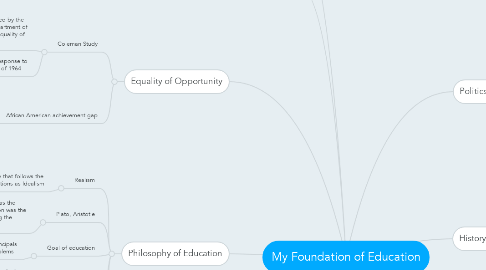
1. Philosophy of Education
1.1. Realism
1.1.1. Philosophy that follows the same traditions as Idealism
1.2. Plato, Aristotle
1.2.1. Both realist, and idealist. Believed studying was the only way to gain ideas, and believed education was the only way to move individuals toward achieving the good
1.3. Goal of education
1.3.1. To be able to apply principals to solve real world problems
1.4. Role of teacher
1.4.1. Should have solid grounding in various studies, and must present ideas in a clear consistent manner, and show various ways to judge works.
1.5. Method of instruction
1.5.1. Lecture, also questioning and answering
1.6. Curriculum
1.6.1. Science, math, reading, writing, and humanities
2. Schools as Organizations
2.1. Hugh Taylor Dekalb Co superintendant
2.1.1. Jeff Sessions Alabama Senator
2.1.1.1. Terri Sewell Representative
2.1.1.2. Martha Roby Representative
2.1.2. Richard Shelby Alabama Senator
2.1.2.1. Mo Brooks Representative
3. Curriculum and Pedagogy
4. Equality of Opportunity
4.1. Coleman Study
4.1.1. Also known as EEOS was commissioned by the United States in 1966 to asses the department of health, education and welfare for the equality of all
4.1.2. This study was a response to the civil rights acts of 1964
4.2. African American achievement gap
4.2.1. African Americans are twice as likely to be held back than white Americans.
4.2.1.1. No child left behind act makes every school in the nation treat students with equal learning opportunity regardless of race or social background.
4.2.2. Race is not a cause for gaps but the lack of schools to treat the students of a different race adequately.
5. Educational Inequality
6. Educational Reform
6.1. A nation at risk
6.1.1. A written report by government leaders and educational reformers along with teacher organizations about the quality of school systems
6.2. no child left behind
6.2.1. Legislation created by George W. Bush that is basically an accountability measure for school systems to meet certain requirements. Explaining that low income families, and minorities were subject to poor teaching.
6.3. School Improvement
6.3.1. In the 1980's business officials claimed schools were not producing qualified personnel to revitalize the economy. The Boston Compact was formed in 1982 and was the first school business partnership. Ever since many business have contributed to reform efforts against schools to produce qualified personnel.
7. Politics of Education
7.1. Traditional
7.1.1. John Locke
7.1.1.1. Families should have the final say in what their child learns
7.2. Conservative
7.2.1. Plato
7.2.1.1. Focus on creating a stable society
8. History of US Education
8.1. The school choice movement
8.1.1. Parents have the right to choose what school their child attends
8.2. Value Added Models
8.2.1. An accountability measure based off standardized test to base teacher salary upon.
8.3. Democratic Liberal Schools
8.3.1. Believes that us history is based upon progressive evolution.
9. Sociological Perspectives
9.1. International Theorist
9.1.1. Critiques the functionalist and conflict theories
9.1.1.1. Basil Bernstien
9.1.1.1.1. Believes that social, and cultural aspects should be viewed wholistically
9.2. Schooling on individuals.
9.2.1. Ron Edmonds suggest that schools that are more academically oriented have more of a learning curve than others.
9.2.1.1. Education and mobility study by McLeod suggest that working class boys have no goals in attaining education but presenting there self as tough and physically hard demonstrating "Fatalism".
